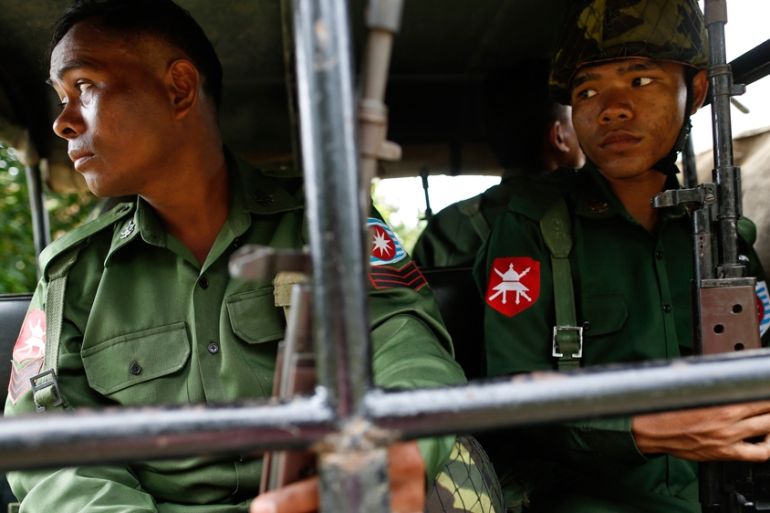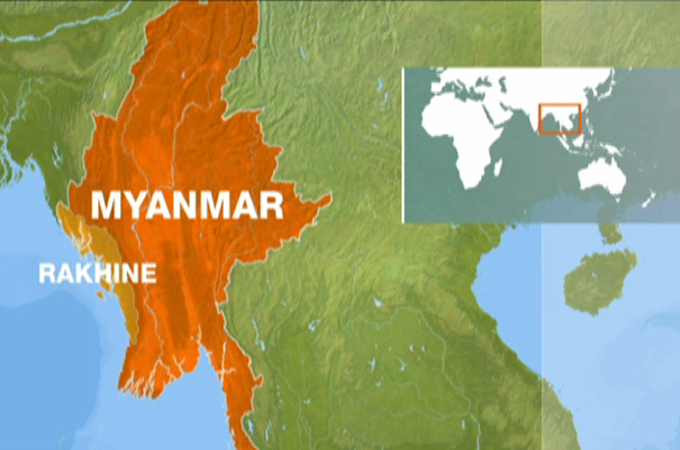Attack kills Myanmar police on Bangladesh border
Death of nine officers in Rohingya-dominated area in Rakhine state sets off military raid that claims eight more lives.

Nine Myanmar police officers have been killed in coordinated attacks by armed men on posts in Rakhine state along the border with Bangladesh, authorities say, setting off a military operation that has killed at least eight people.
The attacks hit three border posts before dawn on Monday near Maungdaw, in the western state of Rakhine, simmering with tensions between Buddhists and Rohingya Muslims, who are forced to live in dire conditions.
Keep reading
list of 4 itemsConflict, climate, corruption drive Southeast Asia people trafficking: UN
Bodies of three Rohingya found as Indonesia ends rescue for capsized boat
How is renewed violence in Myanmar affecting the Rohingya?
“Altogether nine police were killed, four others were injured and one is still missing,” Tin Maung Swe, a senior official within Rakhine’s state government, told AFP news agency.
No one has claimed responsibility for the attacks, but Tin Maung Swe blamed the “insurgent” group known as Rohingya Solidarity Organisation (RSO).
READ MORE: Myanmar bans officials from saying ‘Rohingya’
The RSO was a small Rohingya armed group active in the 1980s and 1990s but has not been heard from in nearly two decades.
In the military operation that followed, eight people were killed as government forces pursued the attackers and searched homes for stolen weapons.
The vast majority of residents in the area are Rohingya, a stateless Muslim minority reviled as foreign illegal immigrants by many among Myanmar’s Buddhist majority.
The attacks prompted neighbouring Bangladesh to increase patrols and stopped crossings through the Teknaf land port.
Fears of fresh unrest
The unrest has stoked fears of a repeat of 2012, when sectarian violence which ripped through Rakhine left more than 100 people dead and displaced tens of thousands.
Police in the capital Naypyidaw confirmed the attack and said a number of weapons were seized by the attackers.
![The latest unrest has stoked fears of a repeat of the 2012 sectarian violence [Reuters File Photo]](/wp-content/uploads/2016/10/a9d87c1509a14a5ca81d446baf5909a6_18.jpeg)
Rakhine has been effectively split on religious grounds since bouts of communal violence tore through the state in 2012, killing scores and forcing tens of thousands to flee.
The Muslim Rohingya are largely confined to camps and face restrictions which rights groups have compared to apartheid.
Several complex ethnic conflicts are rumbling across Myanmar’s borderlands, hampering efforts to build the economy after the end of junta rule.
But compared with the country’s civil war-ravaged eastern and northern border states, Rakhine has not boasted a significant rebel military presence.
Despite their plight, the Rohingya do not have a known armed faction fighting for them.
|
|
In May attackers stormed a security post at a camp for Rohingya refugees in southern Bangladesh, just across the border from Maungdaw.
A Bangladeshi camp commander was shot dead and the attackers made off with weapons.
Police at the time said the Rohingya themselves could be suspects.
In recent years Bangladeshi police have also alleged that Rohingya refugees are involved in criminal activities including human trafficking.
Any rise in violence in Rakhine will be a major concern for the new civilian-led government of Aung San Suu Kyi.
She has asked former Kofi Annan, the former UN chief, to head a commission entrusted with the task of healing religious divisions in Rakhine.
The move was largely welcomed by Rohingya community leaders but angered Buddhist nationalists.
Anti-Muslim sentiment still runs high in the region, fanned by Buddhist nationalists who revile the Rohingya and are viscerally opposed to any move to grant them citizenship.
They insist the roughly one-million strong group are intruders from Bangladesh, even though many can trace their ancestry in Myanmar back generations.
